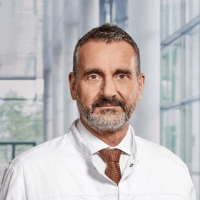Mesothelioma — CRS and HIPEC - Hyperthermic Intraperitoneal Chemoperfusion: treatment in the Best Hospitals of Germany
Treatment prices are regulated by national law of the corresponding countries, but can also include additional hospital coefficients. In order to receive the individual cost calculation, please send us the request and medical records.

Department of Cardiothoracic Surgery and Vascular Surgery
The Department of Cardiothoracic Surgery and Vascular Surgery provides effective surgical treatment for diseases of the heart, respiratory system, and blood vessels. The team of cardiac surgeons operates on patients with heart valve pathologies, coronary heart disease, heart failure, and heart rhythm disturbances. In the field of thoracic surgery, the key focus is on the surgical removal of lung tumors and lung metastases. The specialists in this area also perform surgery to repair chest wall deformities. In the field of vascular surgery, interventions for abdominal and thoracic aortic aneurysms are most often performed here. The department's vascular surgeons are also exceptionally competent in the treatment of peripheral occlusive arterial disease. A great advantage for the department's patients is that almost all surgical interventions are performed using minimally invasive techniques, so there is no need for a long postoperative recovery. The department's operating rooms are equipped with state-of-the-art technology. This allows for effective and safe treatment. The priority is always personalized medical care for patients.







Department of Abdominal and Colorectal Surgery, Hepatobiliary Surgery, Hernia Surgery, Bariatric Surgery, Endocrine Surgery, Thoracic and Vascular Surgery
The Department of Abdominal and Colorectal Surgery, Hepatobiliary Surgery, Hernia Surgery, Bariatric Surgery, Endocrine Surgery, Thoracic and Vascular Surgery offers the full range of services in these medical fields. It provides surgical treatment of diseases of the gastrointestinal tract, thyroid and parathyroid glands, thoracic organs, vascular system, rectum, anus and colon. In addition, the department performs bariatric interventions for the treatment of morbid obesity. A special focus is made on the treatment of gastrointestinal cancer. Minimally invasive surgical techniques are always preferred, if clinically indicated. The team of the department's surgeons has 8 progressive operating rooms equipped with everything necessary for successful treatment. The department also has the da Vinci Xi surgical system for high-precision minimally invasive robot-assisted interventions. The patient's health is in the safe hands of the best German surgeons who have gone through a rigorous selection and have vast clinical experience.







Department of Cardiothoracic Surgery
According to the Focus magazine, the Department of Cardiothoracic Surgery ranks among the top German medical institutions specializing in the surgical treatment of heart diseases! The department offers the full range of first-class medical care for patients with diseases of the heart and thoracic organs that require surgical treatment. The availability in the department of advanced technical base allows for the most sparing treatment and minimally invasive surgery. The main focuses of clinical practice include coronary artery bypass grafting, modern procedures for heart valve reconstruction and replacement, treatment of diseases of the thoracic aorta, as well as treatment of heart failure by implanting an artificial heart.






Pleural mesothelioma is a tumor of the membrane lining the lungs and the chest cavity. This neoplasm is rare but aggressive. Even after surgical treatment, the median survival rates are only 10-17 months. However, doctors in countries with advanced healthcare systems started using a new treatment approach called CRS-HITOC, which can improve long-term patient survival rates. You can make an appointment for this surgical procedure at a favorable cost through the Booking Health website.
Content
- When can hyperthermic intraperitoneal chemotherapy (HIPEC) be used for pleural mesothelioma?
- What is the process of pleural mesothelioma treatment?
- How effective is HITOC for pleural mesothelioma?
- How is CRS-HITOC performed in Germany for pleural mesothelioma?
When can hyperthermic intraperitoneal chemotherapy (HIPEC) be used for pleural mesothelioma?
HIPEC is not used for this disease. The abbreviation stands for hyperthermic intraperitoneal chemotherapy, which implies that the abdominal cavity will be rinsed with a heated solution of chemotherapy drugs.
However, pleural mesothelioma is located in the pleural cavity. Accordingly, oncologists use intrathoracic therapy instead of hyperthermic intraperitoneal chemotherapy to treat this disease. Essentially, the technique is similar to HIPEC. The only difference is that the drugs are administered into the chest cavity instead of the abdominal cavity.
What is the process of pleural mesothelioma treatment?
Cytoreductive surgery (CRS) combined with hyperthermic intrathoracic chemotherapy (HITOC) is considered a promising treatment strategy for patients with pleural malignancies. The spread of tumors along the pleura makes total resection difficult, and small tumor remnants contribute to local recurrences with the following reduced patient survival rates. It is to solve this problem that HITOC is used.
Treatment begins with surgery, which is performed through an open incision in the chest. A doctor removes all visible tumors. Immediately after surgery, the chest cavity is rinsed with a heated solution of chemotherapy drugs, which destroys the remaining tumor cells. The heated drugs penetrate the pleura to a depth of up to 3 mm and enhance the cytotoxic effect of the chemotherapy drugs.
How effective is HITOC for pleural mesothelioma?
Many studies have already been conducted to evaluate the effectiveness of cytoreductive surgery and HITOC for pleural mesothelioma. They show excellent results with a low risk of severe complications.
A 2021 systematic review that included 15 studies involving nearly 600 patients confirmed positive outcomes. Compared to the control group, median survival and recurrence-free period doubled. Moreover, these parameters increased about 2 times more in those patients who received high doses of drugs.
The best hospitals achieved a median survival rate of 75 months (more than 6 years) and a recurrence-free survival rate of 57 months (almost 5 years). Some patients did not have any recurrence by the end of the monitoring period.
Thus, cytoreductive surgery and HITOC provide patients with excellent results in the treatment of pleural mesothelioma. They can extend the life expectancy by several years, and many patients achieve good long-term survival rates. It is not excluded that the procedure offers a real chance of complete recovery from this cancer.
How is CRS-HITOC performed in Germany for pleural mesothelioma?
So far, CRS-HITOC is not considered a standard treatment in medicine. However, it is already used in some German hospitals and other countries with advanced healthcare systems.
One retrospective study describes the experience of treating pleural mesothelioma with this method in 350 patients at four major university hospitals in Germany. Initially, patients underwent cytoreductive surgery at the Thoracic Surgery Center. Whenever possible, all tumors were removed (complete cytoreduction). A platinum drug, or a combination of a platinum drug and doxorubicin, was then administered into the chest cavity (40% of patients). Two-thirds received low doses of a platinum drug, while one-third received high doses. Results were better with high doses, but the risk of kidney failure was higher, affecting 13% of patients.
There are no standard HITOC protocols yet. There is no data regarding the type of drugs used, dosages, or duration of perfusion. Each hospital, therefore, uses its own protocols. German Cancer Centers are among the most experienced in the use of the CRS-HITOC technique, so if you want to take advantage of this treatment option, Germany will be your best choice for cytoreductive mesothelioma surgery.
You can make an appointment for your treatment in Germany through the Booking Health website. On our website, you will find leading hospitals with top-class medical care that perform hyperthermic intraperitoneal and intrathoracic chemotherapy. On the Booking Health website, you can find out the direct prices offered by hospitals, compare costs, and select the best medical facility with the best ratio of cost and quality of medical services.
If you make an appointment for your treatment in Germany through the Booking Health service, the cost of treatment in Germany will be lower for you due to the absence of additional fees for foreigners. Moreover, the initial cost of treatment will not increase. When using the services of the Booking Health company, you get insurance that covers the cost of additional medical procedures, if required.
Authors:
The article was edited by medical experts, board-certified doctors Dr. Vadim Zhiliuk and Dr. Nadezhda Ivanisova. For the treatment of the conditions referred to in the article, you must consult a doctor; the information in the article is not intended for self-medication!
Sources:

